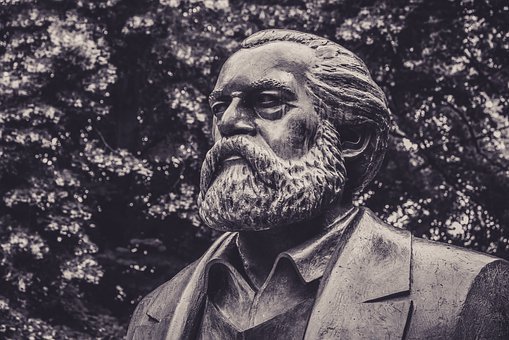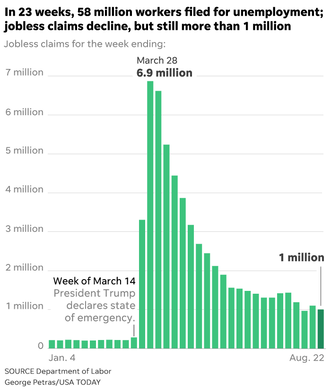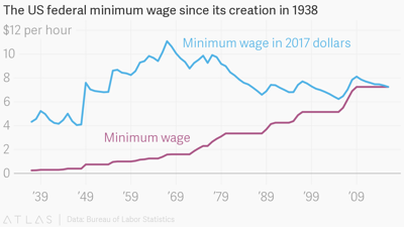|
This essay will be dealing with the concept of the economy, the affects that these concepts have on both society at large and on the average person, the economy as an abstract thought, how it has been treated with reverence, and how the powers that be manipulate it for their own gain. In 2020 we have seen a massive focus on ‘the economy’ as a concept, and the stock market has been used as a basis, particularly in the United States, of measuring the economy. I would first, however, look to examine the very real human cost of neoliberalism, which is the dominant ideology across the west and has been since the 1980’s. This essay will deal with many numbers, and figures, but there within lie striking amounts of human suffering. This will focus on the European champion of neoliberalism, Thatcher, who’s attempts to control inflation cost human lives. While we should rightfully critique all Empires, in doing so we must not forget that at the heart of each of them is a proletariat, one who may not be suffering as poorly as those in the colonial possessions, but one who is suffering nonetheless. In order to reduce inflation, one must naturally increase unemployment and vice-versa. This obviously had major repercussions for the British people, the main victims being the miners in 1984-85. This ploy to destroy the Miner’s Union was foretold by Sir Howe in the last of the four points that were set forth for a growth in government, as Thatcher shut down the mines, the Miners Union, the collective bargaining institution faced the consequences of their actions, they were sent back to work, disgraced, with one miner even commenting: ‘She planned it very very clever – you’ve got to admire her…it all fit in, in that ten year from ’74 to 84…she was determined that, at any cost…she wasn’t going to be defeated and humiliated the same way Ted Heath was…it was all geared up for her to smash the National Union of Mine Workers – and by God it worked, it’s hard to say it, but it worked.’[1] These words are a stark reminder of the human cost of Thatcherism, the men and women whose livelihoods were erased due to the dismantling of the public sector to end subsidies, and the complete dismantling of a faith in strike action, with some area’s support for strikes falling by as much as 22% from 1983-84.[2] Looking forward to our contemporary world, we can see much of the same language being used today in relation to the economy, and more recently the stock market. Despite the economy and the stock market generally working in tandem, i.e. rising and falling together, they are not firmly linked. Unfortunately, due to their apparent relation, we were able to see people like Former-President Trump utilise this relationship to his advantage. When the US Fed pumped $1.5 trillion[3] into the stock market to stop it from freezing up, Trump hailed this as the economy getting back on track, despite 58 million people filing for unemployment benefits in the five months following, which does not include those who were previously on it or on welfare. [See figure 1.1] The rising stock market was also held in high esteem when Trump claimed that the ‘sacred number’ of 30,000 had been hit, even though this number was surpassed in 1999 under President Clinton.[4] The fact of the matter is, the stock market will always rise, it has done for centuries ever since the first Dutch merchants established the first markets. What won’t always rise, however, is the standard of living, we have seen a massive stagnation in it in the West over the past few decades, as wages have decreased in relation to their value, in Fig. 1.2 we can see that the top line (the minimum wage in relation to the purchasing power of the dollar) has in fact decreased to a level of poverty wage, in some cases a starvation wage. This use of ecclesiastical language in relation to the economy highlights just how important the ever-rising stock market and the ever-rising consolidation of wealth is for these corporate entities. The economy is an abstract concept, created by humanity, one that is both all judging God and spoilt child. One that is both untamed beast and mouldable clay. Economic growth is almost inevitable, and the economy will never cease to exist, it will always be there, but it need not always be there to take. It can be there to give also, for the economy itself is not an inherently bad idea, it is just what it is made to be, if the growth of the economy could be funnelled out equally to all those who needed it, then it would be a force for good, not evil. This is something that we see present in China, for example, as sustained economic growth over the past decades has rapidly brought the standard of living up for the average Chinese citizen, despite some shortcomings in the early establishment of the new State. We can see the same in Cuba, despite crippling sanctions imposed by the United States, who would no doubt wat to reacquire Cuba as an imperial holding. The main ‘criticism’ on the attempted ‘control’ of the economy is to equate it to socialism, a scare tactic that works extremely well in the United States, yet when we use their own logic, is Former President Trumps pumping of trillions of tax-payer dollars into the economy to give it the illusion of stability and growth not socialism? They would say no, because they blindly support Trump and the Republican party, much like liberals will blindly support Biden and the Democratic party. I would say no because, as Irish Socialist Scholar and Revolutionary James Connolly said: ‘State ownership and control is not necessarily socialism – if it were then the Army, the Navy, the Police, the Judges, the Jailers, the Informers, and the Hangmen, all would be Socialist functionaries, as they are state officials – but the ownership by the State of all the land and materials for labour, combined with the cooperative control of the workers of such land and material, would be Socialism.’[5] So, the question must be asked, how can we make sure that the economy serves the people? Adaptive Marxism You may have seen the phrase ‘Adaptive Marxism’ in the title of this essay, and this is where this term comes into play. I have coined the phrase and theory of Adaptive Marxism because it is vital that we properly propel Marxist thought into a more robust and efficient model for the 21st Century, we first must admit that it has faults and successes in each of its iterations. We must champion any small improvement to the working class, as every step forward makes each leftist policy more mainstream, and gives the working class an opportunity to gain more free time in which they can assess their situation. There is no one perfect school of Marxist thought or text, Anarchists such as Kropotkin highlight that all property on earth is common: ‘Millions of human beings have laboured to create this civilisation on which we pride ourselves today. Other millions scattered across the globe labour to maintain it. Without them, nothing would be left in fifty years but ruins. There is not even a thought, nor invention, which is not common property, born of the past and the present. Thousands of inventors, known and unknown, who have died in poverty, have co-operated in the invention of each of these machines which embody the genius of man.’[6] Here we see an anarchist making an incredibly vital point which may prove to stir the lumpenproletariat, should a Marxist-Leninist not utilise this form of anarchist thought as it would help in establishing a more equal society? Likewise, Lenin made worthy cases for a strong state that would later come to fruition: ‘History has now confronted us with an immediate task which is the most revolutionary of all the immediate tasks confronting the proletariat of any country. The fulfilment of this task, the destruction of the most powerful bulwark, not only of European, but (it may now be said) of Asiatic reaction, would make the Russian proletariat the vanguard of the international revolutionary proletariat.’[7] We can see the importance of this as the USSR went on to help deter America from intervention in Cuba, and it also kept strong diplomatic ties with the non-aligned, yet socialist, Burkina Faso under Sankara. Sankara was a man who studied Marx and Lenin, a man who brought mass inoculation to his homeland, who vastly improved gender equality, and ended the tribal practice of slavery in his home. Can an anarchist not admit that this mighty statist had a greatly positive impact on the proletariat and peasantry of his nation? Of course he can, and as adaptive Marxism evolves to encompass the undeniably positive aspects of all Marxist schools of thought, it too can then debate the more controversial assertions of each political faction such as decentralization vs centralization, or how to appropriately combat wage slavery, all while keeping a fundamental principle of Adaptive Marxism. Through this theory, we can bend the economy to our will, taking the Chinese markets that provide economic growth, combine them with the Cuban healthcare system which is vastly underappreciated due to US propaganda and implement the inoculation and gender equality theories and efforts of Burkina Faso and we truly can create a Non-Western, Non-Eastern, and Non-Afro-Centric Marxism that will truly be one for all proletariat of the world. We must also step outside of the Western views of 19th Century Marxists, the world of old is not the same as it is today, Pan-African scholars are too often side lined by Western Philosophers who are centuries passed. Further essays will explore the intricacies of Adaptive Marxism. Citations [1] Richard Vinen, Thatcher’s Britain, Politics and Social Upheaval of the 1980’s, (London, 2009) [2] Ben Jackson, and Robert Saunders (eds.), Making Thatcher’s Britain, (Cambridge, 2012), pp. 150-53 [3] Jolly, Jasper, Partington, Richard, US Fed injects $1.5tn to markets as Dow and FTSE suffer worst day since 1987, (March 12th, 2020) [4] O’Mahony, Proinsias, Stocktake: Trump talks bull as Dow tops 30,000, (December 1st, 2020) [5] Harkin, Shaun, The James Connolly Reader, (Chicago, 2018), p. 23 [6] Kropotkin, Peter, The Conquest of Bread, (Norwich, 1913), p. 13 [7] Lenin, V.I., The Immediate Task of the Soviet Government AuthorCormac Kavanagh is a history student in his final year of University. His main subject of interest is the history of Empire building in relation to Ireland and how it is historically used as a blueprint for later colonies. He is also interested in dissecting the role of the US in the world and how their efforts to thwart unionization and socialism both at home and abroad can be combatted. He is hoping to shine a light on Irish history in relation to Empire and on socialist movements in Europe, both in the past and present.
1 Comment
Lorenzo
3/23/2021 06:13:53 pm
muchas gracias, buen trabajo
Reply
Leave a Reply. |
Details
AuthorWrite something about yourself. No need to be fancy, just an overview. Archives
February 2023
Categories
All
About the Midwestern Marx Youth LeagueThe Midwestern Marx Youth League (MMYL) was created to allow comrades in undergraduate or below to publish their work as they continue to develop both writing skills and knowledge of socialist and communist studies. Due to our unexpected popularity on Tik Tok, many young authors have approached us hoping to publish their work. We believe the most productive way to use this platform in a youth inclusive manner would be to form the youth league. This will give our young writers a platform to develop their writing and to discuss theory, history, and campus organizational affairs. The youth league will also be working with the editorial board to ensure theoretical development. If you are interested in joining the youth league please visit the submissions section for more information on how to contact us!
|




 RSS Feed
RSS Feed